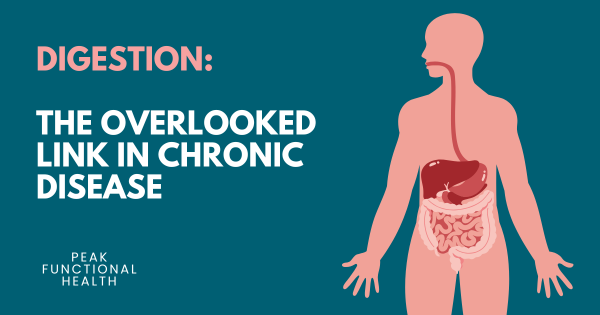Digestion: The Overlooked Link in Chronic Disease

In our recent exploration of the three roots behind chronic disease, we’ve discussed how diagnoses, symptoms, and labels are not the problem themselves, but the branches of a deeper issue. To create lasting change, we must first support the roots by tending to the terrain in which they grow.
Last time, we examined genetics—not as a fixed destiny, but as a starting point. Today, we turn to one of the most fundamental and often-overlooked roots: digestion.
If genetics is the blueprint you’re born with, digestion is the engine that powers the entire system. It’s the core process that determines whether the food you eat becomes fuel—or a source of dysfunction. In Functional Nutrition, digestion is considered an essential starting place. No matter the symptoms or diagnosis, digestive function is one of the first areas we assess.
And for good reason: when digestion doesn’t work, nothing works.
Even if you're eating the “perfect” diet, your body can’t benefit from what it can’t digest. This is why we say: You are not just what you eat—you are what your body can do with what you eat.
Digestive Dysfunction: The Hidden Root of Chronic Symptoms
Most people associate digestive problems with symptoms like bloating, gas, constipation, or acid reflux—and these are important signals. But poor digestion doesn’t always announce itself in obvious ways.
When digestion breaks down, it can trigger a cascade of issues far beyond the gut, including:
Autoimmune disorders
Anxiety, depression, and brain fog
Skin conditions like eczema or acne
Thyroid issues such as hypothyroidism or Hashimoto’s
Fatigue and nutrient deficiencies
Hormonal imbalances and infertility
Asthma, allergies, and joint pain
Metabolic dysfunction, including obesity and diabetes
Even cancer and cardiovascular disease
How? The gut is intricately connected to inflammation, detoxification, immune regulation, hormone balance, and mental health—systems that influence every organ in your body. In fact, an estimated 70% of your immune system resides in the gut.
That makes sense when you consider that your digestive tract is in constant contact with the outside world. It’s a front-line defense system—and when compromised, that defense can falter.
Consider when the flu or a cold strikes. We often blame cold weather or close contact indoors. But think about the seasonal context: holiday gatherings often involve consuming foods that weaken immune function—heavy sugars, processed treats, alcohol. When your immune system is down-regulated by poor food choices, it’s more susceptible to opportunistic microbes.
It’s no coincidence that the post-holiday period is rife with illness—yet we rarely look to our food as the cause. And beyond the passing cold, compromised digestion is a root cause of many chronic conditions:
Leaky Gut (Intestinal Permeability): Tiny gaps in the gut lining allow undigested food particles, toxins, and microbes to enter the bloodstream. The immune system mounts a defense, triggering widespread inflammation, allergies, and autoimmune responses.
Microbiome Imbalance (Dysbiosis): A disrupted balance of bacteria, fungi, and viruses can lead to immune dysfunction, mood disorders, and metabolic issues. Overgrowth of harmful microbes—like in SIBO or Candida—can wreak havoc on your health.
Low Stomach Acid: Often mistaken for too much acid, acid reflux may actually stem from too little. Without sufficient stomach acid, proteins aren’t broken down, nutrients aren’t absorbed, and pathogens aren’t neutralized.
Enzyme Deficiency: Digestive enzymes help break down food. When they’re lacking, food ferments in the gut, causing bloating, gas, and overgrowth of harmful bacteria.
Slow Transit Time: Food needs to move through the digestive system efficiently. If it lingers, it ferments, breeds bacteria, and recirculates toxins that should have been eliminated.
Supporting the Root for Whole-Body Healing
By supporting digestive health, we reduce systemic inflammation, enhance nutrient absorption, and establish a foundation for healing throughout the body.
At Peak Functional Health, digestive health is both a diagnostic and therapeutic starting point. We help you:
Identify and correct nutrient deficiencies
Repair leaky gut and rebalance the microbiome
Restore stomach acid and enzyme function
Address food sensitivities and eliminate inflammatory triggers
Improve motility and support detox pathways
Rebuild a terrain that supports whole-body healing
Takeaway: Heal the Gut, Heal the Body
It may sound simple, but it’s profound: when digestion works, the body can begin to heal.
It’s not always about adding more interventions—it’s about removing what blocks healing and supporting what your body already knows how to do.
The road to lasting health starts in the gut.
Coming Next: Inflammation – The Third Root
In the next installment of this series, we’ll explore inflammation: how it starts, how it spreads, and what you can do to calm the fire.
Stay in touch!
Subscribe to our newsletter for periodic updates, special offers, and education!
Thank you for subscribing!
Have a great day!